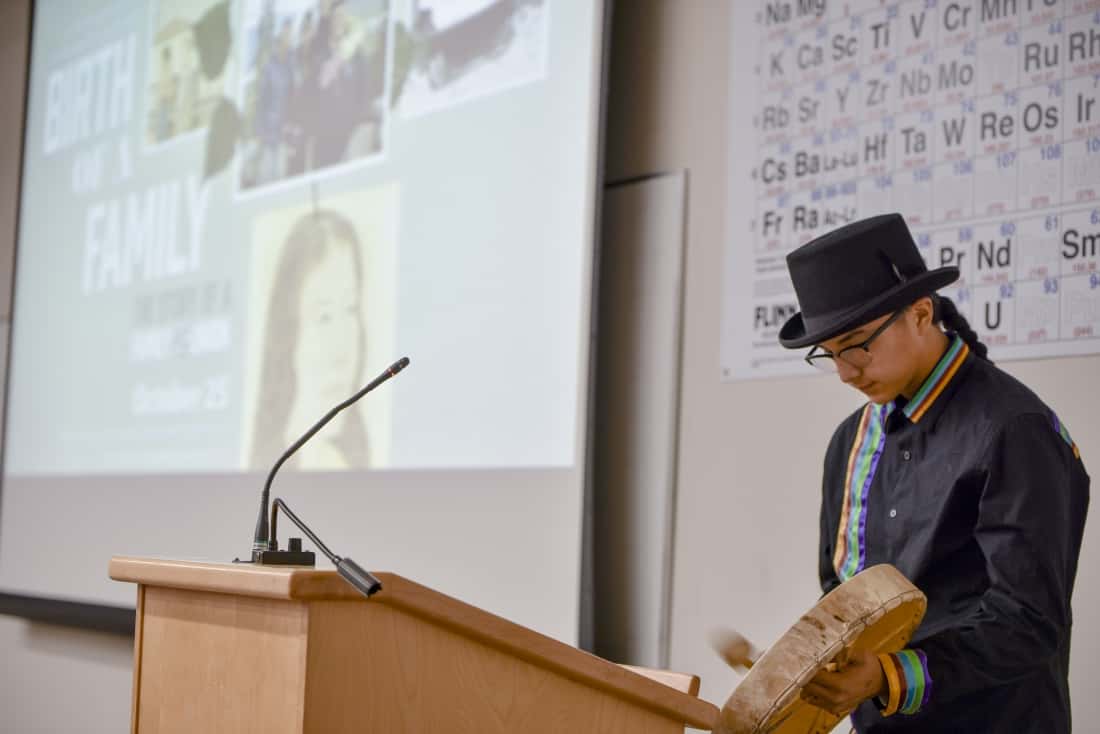
Special guest Bluejay Linklater offered a honour song before the screening held in the Neatby-Timlin Theatre.
On Oct. 25, the University of Saskatchewan Aboriginal Students’ Centre hosted a documentary screening of Birth of a Family to educate students and community members about the effects of the Sixties Scoop, the forced relocation of Indigenous children to non-Indigenous homes from the beginning of the 1960s until the end of the 1980s.
Special guests Tasha Hubbard, film director and faculty member in the department of English at the U of S, and StarPhoenix reporter Betty Ann Adam, who was taken from her mother as a child and whom the documentary follows, were both in attendance to answer questions from the audience regarding the film and the impact of the Sixties Scoop.
When asked how this film affected her, Jasmyn Albert, fourth-year Indian Teacher Education Program student majoring in social sciences, explained that she is upset that the effects of the Sixties Scoop are still present and impact many people today.
“I think it’s an eye-opener to see the actual effects, and it saddens me to see that there [are] Indigenous people out there in their 50s and older, and they don’t know [their] culture or [their] language,” Albert said.
The Sixties Scoop consisted of the Canadian government forcibly taking Indigenous children and relocating them to different homes, provinces and even different countries, creating intergenerational effects. Indigenous families were not given information as to where their children were relocated to. It is estimated that between 11,000 and 20,000 Indigenous children were relocated during the 1960s, 1970s and 1980s in Canada.
The 2017 National Film Board of Canada documentary Birth of a Family follows the reunion of Adam, who was taken from her mother as a toddler, and her siblings after over 40 years apart. During the question-and-answer session after the film screening, Adam explained that she hopes students will become more aware of the Sixties Scoop after watching the film, as the effects have been long-lasting.
“This is shining a light on a big [issue] Canadians didn’t know about, but part of what we don’t know as a society is that we don’t know that this is still going on,” Adam said. “Indigenous parents, Indigenous women in particular, are still seen as not being ‘mother material.’”
In October 2017, the Government of Canada reached a settlement with the First Nations and Inuit peoples who were taken from their homes unwillingly. The federal government will be providing from $25,000 to $50,000 per person, depending on how many claimants apply for compensation.
One of the organizers of the screening, Graeme Joseph, team leader for First Nations, Métis and Inuit student success and manager of the ASC at the Gordon Oakes Red Bear Student Centre, discusses why the ASC believes that films regarding Indigenous issues need to be shown.
“What we hope to do through these presentations, this collaboration between us and the [College of] Arts and Science, is to bring greater awareness [to] the issues in regards to the Sixties Scoop,” Joseph said.
Meguan Oksasikewiyin, fourth-year ITEP student majoring in social sciences, believes that documentaries like Birth of a Family should be more widely shown and are important from a future educator’s point of view.
“Personally, [as] an education student, it’s really important, because we are responsible for teaching kids — the next generation — the true history. And I feel like, if you teach them from a young age, it shows them compassion and it gets rid of a lot of ignorance.”
An abridged version of Birth of a Family will air on CBC-TV at 9 p.m. on Nov. 19.
—
Sam Campling
Photo: J.C. Balicanta Narag / Photo Editor